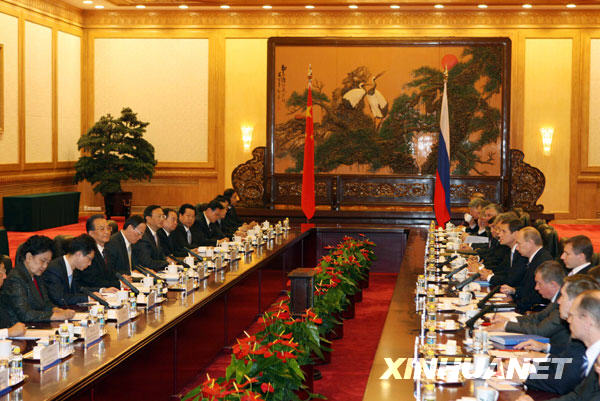
On October 13, 2009, Chinese Premier Wen Jiabao and his Russian counterpart Vladimir Putin held the 14th regular meeting between Chinese and Russian prime ministers in Beijing. In a friendly and pragmatic atmosphere, both sides reviewed the six decades of China-Russia diplomatic relations. They had in-depth exchange of views on bilateral exchange and cooperation in all areas as well as international and regional issues of common concern and reached broad and important consensus.
Bilateral relations have become stable, mature and important state-to-state relations since the forging of diplomatic ties 60 years ago and particularly the establishment of the Russia-China strategic cooperative partnership in 1996, Wen said. The political mutual trust, strategic and practical cooperation between the two countries have been improved continuously and yielded many achievements, which effectively safeguards and advances common interests of the two countries and positively influences the world's peace and development, he said. Sino-Russian strategic cooperative partnership is a role model of relations between neighboring countries and relations between big powers, said Wen.
Wen pointed out that currently the world is undergoing great changes, great adjustment and great development. It is conducive to the two countries and the world at large for China and Russia, as neighboring countries, big powers and permanent members of the UN Security Council, to uphold good-neighborly friendship and strategic cooperation. China is ready to work with Russia to push bilateral strategic cooperative partnership to a new level. He believed that with the joint efforts of both sides, China-Russia relations will surely bring more benefits to both peoples and contribute more to safeguarding world peace and promoting common development.
Putin congratulated Wen on the 60th anniversary of the founding of the People's Republic of China, saying that thanks to the joint efforts of both sides, Russia and China have established a genuine and comprehensive strategic and cooperative partnership. Both sides have continuously built up political trust, completely resolved the border issue, gradually expanded cooperation in economic, trade and other sectors and cooperated closely in international affairs. Putin said his visit to China, which coincided with the 60th anniversary of the Russia-China diplomatic ties, has achieved a range of important outcome, which fully reflects the common interest and broad consensus between the two countries on many issues and is of great significance to the future development of bilateral ties. Russia is ready to work with China to well implement the already-reached consensus and continuously deepen and expand bilateral pragmatic cooperation.
The two prime ministers reached consensus on furthering bilateral cooperation in the following aspects:
First, enhance political trust, address each other's core interests and major concerns, and support each other's measures to safeguard state sovereignty, security and territorial integrity so as to consolidate the political foundation of bilateral ties.
Second, deepen economic and trade cooperation. Both sides agreed to do a good job in building large cooperation projects and develop innovative cooperation models; further expand trade on machinery and electronic products and optimize trade mix; regulate the market order; enhance financial cooperation and expand domestic currency settlement; increase mutual investment and economic and technological cooperation, promote trade facilitation and oppose trade and investment protectionism.
Third, expand energy cooperation. They agreed to implement China-Russia inter-governmental agreement on oil cooperation and deepen upstream-downstream integration cooperation in the oil sector. They agreed to work together to make sure the oil pipeline, running from Skovorodino, Russia, to China's northeastern city of Daqing, would be completed by the end of 2010 and start stable oil supply in 2011. Both sides also pledged to increase crude oil trade via railway. They signed a road map on gas cooperation and decided to launch the west and east lines of the gas project simultaneously in a bid to start supplying gas between 2014 and 2015. The two sides also agreed to advance major cooperation projects in nuclear energy, coal and other areas.
Fourth, enhance cooperation in the fields of aerospace and aviation, science and technology, transportation, communications and information technology, forestry, quality control and environmental protection.
Fifth, enhance cooperation between localities by implementing an outline of regional cooperation between Northeast China and the Russian Far East Area and Eastern Siberia.
Sixth, promote humanities cooperation. They agreed to set up cultural centers in each other's countries at an early date, ensure the success of the "Year of the Chinese Language" to be held in Russia next year, continue to boost cooperation on health, sports, media and tourism and strengthen youth exchange.
Seventh, step up coordination in international affairs to deal with the global challenges. Both sides agreed to jointly promote the establishment of a new international financial order that is fair, just, inclusive and orderly and improve representation and voice of the developing countries and emerging economies.
Following the meeting, the two prime ministers signed the joint communiqué of the fourteenth regular meeting between the Chinese and Russian prime ministers (the full text of the joint communiqué will be released separately). They also witnessed the signing of 12 bilateral cooperation documents and met the press.
Prior to the meeting, Wen hosted a welcoming ceremony for Putin at the Square outside the East Gate of the Great Hall of the People. Chinese Vice Premier Wang Qishan, also chairman of the Chinese side of the Sino-Russian Prime Ministers' regular meeting committee, State Councilor Liu Yandong, also chair of the Chinese side of the committee on China-Russia cultural and humanities cooperation, Vice-Chairman of the Central Committee of China Democratic National Construction Association Zhang Shaoqin, Foreign Minister Yang Jiechi, Minister of the National Development and Reform Commission Zhang Ping, Minister of Education Zhou Ji, Minister of Industry and Information Technology Li Yizhong, Minister of Environment Protection Zhou Shengxian, Minister of Railways Liu Zhijun, Minister of Commerce Chen Deming, Minister of Culture Cai Wu, Director of the General Administration of Customs Sheng Guangzu and Chinese Ambassador to Russia Li Hui attended the welcoming ceremony.